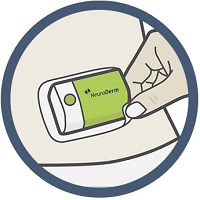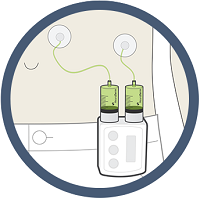 |
| The ND0612L patch pump for moderate Parkinson's--Courtesy of NeuroDerm |
The FDA lifted the clinical hold on Neuroderm's ($NDRM) subcutaneously delivered Parkinson's candidates, paving the way for more studies of the liquid formulations of levodopa and carbidopa in the second half of this year. In response to the Friday morning news, the company's stock ended the day up more than 10%. But with a market cap around $220 million and a stock price below $13, Neuroderm remains a small cap stock.
FDA questions about candidates' delivery devices--a patch pump for ND0612L for moderate Parkinson's and a belt pump for ND0612H for more severe cases--led to the hold, but the announcement means that the information provided by Neuroderm has proven sufficient. Neuroderm said it completed a compatibility study to gather the additional data.
"Having lifted the clinical hold in the first half of 2015 means that our U.S. clinical development program of ND0612H and ND0612L is proceeding on track," said Neuroderm CEO Oded Lieberman, in a statement. "Parkinson's patients have been hoping for a less invasive, non-surgical alternative that can deliver levodopa continuously. We remain committed to the execution of our plan to bring these product candidates to the market as soon as possible, and to make a significant impact on the lives of Parkinson's patients."
The hold was placed by the FDA almost a year ago following Neuroderm's IND submission to commence Phase IIa trials on the candidates. According to Neuroderm's November 2014 SEC filing in preparation for an IPO, the FDA requested an extractables and leachables study, as well as additional information about the devices, which were approved in the European Union.
 |
| The ND0612H belt pump for severe Parkinson's--Courtesy of NeuroDerm |
"Our next U.S. trials are planned to commence in the second half of 2015; therefore, the FDA's letter has not had, and we anticipate it will not have, an impact on our timelines," the filing said.
To the delight of Wall Street, Neuroderm reported positive results of the Phase IIa clinical trial in January. The trial demonstrated that the two candidates had a good safety profile and were well-tolerated by the patients. Moreover, the fluctuations in levodopa plasma levels were lower compared to that achieved by oral administration of the drug. For that feat, thank the candidates' novel form of continuous drug delivery, which is designed to overcome levodopa's short half life and provide a steady level of the drug in the body.
Fluctuating levels of oral levodopa and the need for multiple doses per day have made Parkinson's one of the hottest areas for drug delivery researcher as players scramble to develop new formulations and administration methods.
Neuroderm's candidates, slated for approval in 2018 if all goes as planned, would rival AbbVie's ($ABBV) levodopa/carbidopa formulation, Duopa, as well as Impax Laboratories' ($IPXL) Rytary. Both were approved in January. Duopa also achieves continuous delivery by administering levodopa and carbidopa straight into the patient's small intestine over 16 consecutive hours using an infusion pump and a procedurally placed tube, while Rytary contains immediate- and extended-release beads of levodopa/carbidopa.
- read the release